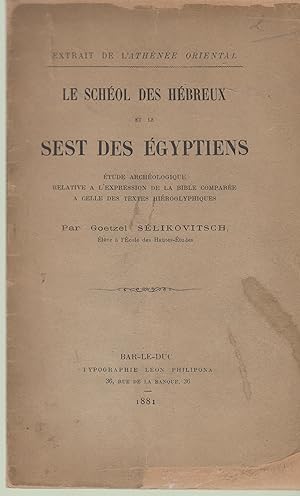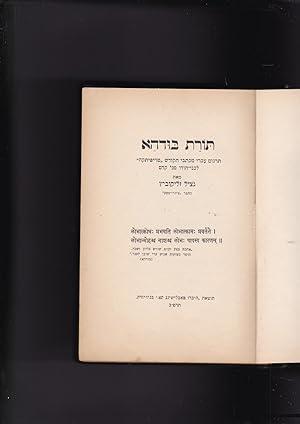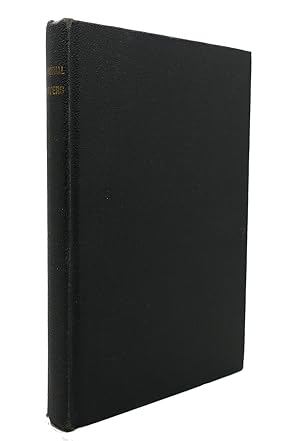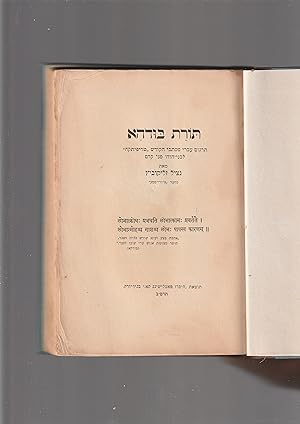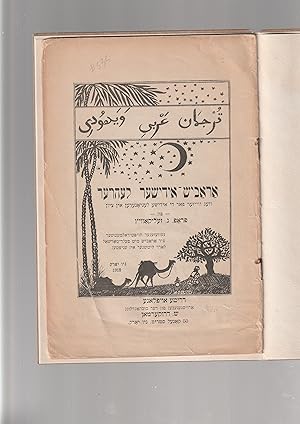selikovitsch (10 risultati)
Tipo di articolo
- Tutti gli articoli
- Libri (10)
- Riviste e Giornali
- Fumetti
- Spartiti
- Arte, Stampe e Poster
- Fotografie
- Mappe
-
Manoscritti e
Collezionismo cartaceo
Condizioni
Legatura
Ulteriori caratteristiche
- Prima edizione (2)
- Copia autografata
- Sovraccoperta
- Con foto (6)
- No print on demand (9)
Spedizione gratuita
Paese del venditore
Valutazione venditore
-
Memorial Prayers and Meditations
Editore: Hebrew Publishing Company
Da: Anderson Book, Provo, UT, U.S.A.
Libro
Hardcover. Condizione: Poor. Condizione sovraccoperta: None. Spine breaking, pages still intact. Brown cloth boards with embossed menorah.
-
Memorial Prayers and Meditations
Editore: Hebrew Pub. Co., 1910
Da: Dunaway Books, St. Louis, MO, U.S.A.
Hardcover. Condizione: Good. 12mo in black cloth. Front hinge starting.
-
The Jewish-American Orator, Containing 517 Choice Speeches and Sermons
Editore: Hebrew Pub, 1909
Da: John Trotter Books, London, Regno Unito
Hardcover. Scuffed Black Cloth., Good.
-
Memorial Prayers and Meditations.
Editore: Hebrew Publishing Company, New York, 1910
Da: The Book Gallery, Jerusalem, Israele
195x130 mm. 60+94 pages. Hardcover. Spine upper edge bumped. Pen inscription on few pages. Pages yellowing. Else in good condition. The book is in : Hebrew English.
-
Geklibene shriften : mit zayn biografye un bild / fun G.Zelikovits (1913) [Leatherbound]
Data di pubblicazione: 2022
Da: S N Books World, Delhi, India
Libro Print on Demand
Leatherbound. Condizione: NEW. Leatherbound edition. Condition: New. Leather Binding on Spine and Corners with Golden leaf printing on spine. Bound in genuine leather with Satin ribbon page markers and Spine with raised gilt bands. A perfect gift for your loved ones. Reprinted from 1913 edition. NO changes have been made to the original text. This is NOT a retyped or an ocr'd reprint. Illustrations, Index, if any, are included in black and white. Each page is checked manually before printing. As this print on demand book is reprinted from a very old book, there could be some missing or flawed pages, but we always try to make the book as complete as possible. Fold-outs, if any, are not part of the book. If the original book was published in multiple volumes then this reprint is of only one volume, not the whole set. IF YOU WISH TO ORDER PARTICULAR VOLUME OR ALL THE VOLUMES YOU CAN CONTACT US. Resized as per current standards. Sewing binding for longer life, where the book block is actually sewn (smythe sewn/section sewn) with thread before binding which results in a more durable type of binding. Pages: 300 Language: yid Pages: 300.
-
La Schéol des Hébreux et le Sest des Égyptiens. Étude archéologique relative à l'expression de la Bible comparée à celle des textes héroglyphiques.
Editore: Bar-le-Duc : Léon PHILIPONA, 1881
Da: PRISCA, Paris, Francia
Prima edizione
Couverture souple. Condizione: Bon. Edition originale. In-8° broché, 18 pages.
-
The Teachings of Buddha
Editore: The Hebrew Publishing Company, New York, 1922
Da: Meir Turner, New York, NY, U.S.A.
Libro
Hardcover. Condizione: Fair. In Hebrew, with 12 pages in English. 143, xii, pages. Blue cloth with gold lettering on cover. Front cover title in Hebrew, rear cover in English. Two frontispieces. Professionally re-backed. Reprinted, with important changes, from the Hebrew Daily "Hadoar", November-February, 1922. The original text, comprising the gospel of Buddha Gautama, for the first time translated into Biblical Hebrew, with introduction and notes and a brief glossary in Rabbinical Hebrew. George (Getzel) Selikovitsch; (May 23, 1855 Lithuania - November 27, 1926 U.S.A.) was an Egyptologist, translator into Arabic, author of romantic novels in Yiddish, and writer and editor of the Yiddish press in the United States. He was born in the town of Rietavas in the Kaunas region of the Russian Empire, in the Moshav area (Lithuanian region). About 200 Jewish families lived in the town at that time. His mother ran a leather shop and supported the family, while his father was a Perushi, a disciple of the Vilna Gaon, who left for Eretz Israel, as did many of the Prushim. Selikovitsch studied at various Yeshivot, and acquired a secular education from his mother, who taught him the alphabet in German and Russian and from his reading in Yiddish. He continued his education himself with the help of books and dictionaries he found. From 1875 to 1878, he lived in Algeria, Tunisia, and Morocco, where he worked as a secretary for a mining company and as a clerk in a law firm. He learned Arabic and also spoken Hebrew, with the Sephardic pronunciation. In 1878 he moved to Paris, was a Hebrew teacher for the children of Michael Erlanger, a rabbi and educator who was one of the dominant figures in the Paris community and Baron Rothschild's emissary to the colonies in Israel. Zelikowicz attended classes in Jewish studies taught by Prof. Joseph Darenburg and studied ancient Semitic languages and Egyptology at the Sorbonne. After graduating he worked as a librarian in the Oriental Department of the National Library in Paris, and may also have taught the hieroglyphics at the University. In 1879, Zelikowicz began sending articles to the Hebrew newspaper Ha - Maggid. His initial essays are short scholarly ones dealing with difficult words or phrases in the ancient sources. He published articles in the Maggid and also articles in French in the French Jewish monthly L'Israelite Univers, in which he expressed his views against the Reform Jews and praised the contribution of medieval Jewish sages to the development of the Hebrew language. In the journal of the French Oriental Society L'Athenee Oriental, Zelikowicz published two articles on scientific topics, one dealing with the concept of the underworld among the Hebrews and the other with the concept of time among the ancient Egyptians. In 1879, Eliezer Ben-Yehuda met Zelikowicz in Paris. According to Ben-Yehuda, his conversations with Zalkowitz, who spoke Hebrew with the Sephardic pronunciation, led him to the recognition that Hebrew could be a modern spoken language. In his article "The Dream and its Break", Ben-Yehuda writes that when met Zelikowicz and for the first time and heard Hebrew spoken in a simple, natural manner with a Sephardic pronunciation, while Ben Yehuda, was speaking in the manner of Amnon and Tamar. It led Ben Yehuda to the idea of resurrecting spoken Hebrew. In the early 1880s, a rebellion broke out in Sudan, which was under Egyptian rule and European powers? influence, especially Britain?s. Muhammad Ahmad ibn Sayyid Abdullah, who proclaimed himself "Mahdi" (Arabic: "the Redeemer"), succeeded in uniting the tribes in Sudan with Islamic fanaticism, and in 1884 ruled almost all provinces of the country. The British Empire sent General Charles Gordon, who had previously served in Sudan, to withdraw the Egyptian troops who had been under rebel attacks in Khartoum. Gordon reached Sudan, . . . Zelikowicz was the Arabic interpreter for the British delegation that set out to rescue General Gordon.
-
MEMORIAL PRAYERS AND MEDITATIONS
Editore: Hebrew Publishing Company N.D., New York
Da: Rare Book Cellar, Pomona, NY, U.S.A.
Prima edizione
Hardcover. First Edition; First Printing. Very Good+ in boards.
-
The Teachings of Buddha
Editore: The Hebrew Publishing Company, New York, 1922
Da: Meir Turner, New York, NY, U.S.A.
Libro
Hardcover. Condizione: Very Good. In Hebrew, with 12 pages in English. 143, xii, pages. Newly bound. 2 frontispieces. Reprinted, with important changes, from the Hebrew Daily "Hadoar", November-February, 1922. The original text, comprising the gospel of Buddha Gautama, for the first time translated into Biblical Hebrew, with introduction and notes and a brief glossary in Rabbinical Hebrew. George (Getzel) Selikovitsch; (May 23, 1855 Lithuania - November 27, 1926 U.S.A.) was an Egyptologist, translator into Arabic, author of romantic novels in Yiddish, and writer and editor of the Yiddish press in the United States. He was born in the town of Rietavas in the Kaunas region of the Russian Empire, in the Moshav area (Lithuanian region). About 200 Jewish families lived in the town at that time. His mother ran a leather shop and supported the family, while his father was a Perushi, a disciple of the Vilna Gaon, who left for Eretz Israel, as did many of the Prushim. Selikovitsch studied at various Yeshivot, and acquired a secular education from his mother, who taught him the alphabet in German and Russian and from his reading in Yiddish. He continued his education himself with the help of books and dictionaries he found. From 1875 to 1878, he lived in Algeria, Tunisia, and Morocco, where he worked as a secretary for a mining company and as a clerk in a law firm. He learned Arabic and also spoken Hebrew, with the Sephardic pronunciation. In 1878 he moved to Paris, was a Hebrew teacher for the children of Michael Erlanger, a rabbi and educator who was one of the dominant figures in the Paris community and Baron Rothschild's emissary to the colonies in Israel. Zelikowicz attended classes in Jewish studies taught by Prof. Joseph Darenburg and studied ancient Semitic languages and Egyptology at the Sorbonne. After graduating he worked as a librarian in the Oriental Department of the National Library in Paris, and may also have taught the hieroglyphics at the University. In 1879, Zelikowicz began sending articles to the Hebrew newspaper Ha - Maggid. His initial essays are short scholarly ones dealing with difficult words or phrases in the ancient sources. He published articles in the Maggid and also articles in French in the French Jewish monthly L'Israelite Univers, in which he expressed his views against the Reform Jews and praised the contribution of medieval Jewish sages to the development of the Hebrew language. In the journal of the French Oriental Society L'Athenee Oriental, Zelikowicz published two articles on scientific topics, one dealing with the concept of the underworld among the Hebrews and the other with the concept of time among the ancient Egyptians. In 1879, Eliezer Ben-Yehuda met Zelikowicz in Paris. According to Ben-Yehuda, his conversations with Zalkowitz, who spoke Hebrew with the Sephardic pronunciation, led him to the recognition that Hebrew could be a modern spoken language. In his article "The Dream and its Break", Ben-Yehuda writes that when met Zelikowicz and for the first time and heard Hebrew spoken in a simple, natural manner with a Sephardic pronunciation, while Ben Yehuda, was speaking in the manner of Amnon and Tamar. It led Ben Yehuda to the idea of resurrecting spoken Hebrew. In the early 1880s, a rebellion broke out in Sudan, which was under Egyptian rule and European powers? influence, especially Britain?s. Muhammad Ahmad ibn Sayyid Abdullah, who proclaimed himself "Mahdi" (Arabic: "the Redeemer"), succeeded in uniting the tribes in Sudan with Islamic fanaticism, and in 1884 ruled almost all provinces of the country. The British Empire sent General Charles Gordon, who had previously served in Sudan, to withdraw the Egyptian troops who had been under rebel attacks in Khartoum. Gordon reached Sudan, . . . Zelikowicz was the Arabic interpreter for the British delegation that set out to rescue General Gordon.
-
Arabish-Idisher lehrer
Editore: S. Druckerman, 50 Canal Street, New York, New York, 1918
Da: Meir Turner, New York, NY, U.S.A.
Libro
Soft cover. Condizione: Very Good. No Jacket. 3rd Edition. In Yiddish and Arabic in Yiddish transliteration. 31 pages. 23 x 16 cm. Paper wrappers bound in hard cover. This work was intended for the Jewish Legionnaires in Eretz IsraeL. George (Getzel) Selikovitsch; (May 23, 1855 Lithuania - November 27, 1926 U.S.A.) was an Egyptologist, translator into Arabic, author of romantic novels in Yiddish, and writer and editor of the Yiddish press in the United States. He was born in the town of Rietavas in the Kaunas region of the Russian Empire, in the Moshav area (Lithuanian region). About 200 Jewish families lived in the town at that time. His mother ran a leather shop and supported the family, while his father was a Perushi, a disciple of the Vilna Gaon, who left for Eretz Israel, as did many of the Prushim. Selikovitsch studied at various Yeshivot, and acquired a secular education from his mother, who taught him the alphabet in German and Russian and from his reading in Yiddish. He continued his education himself with the help of books and dictionaries he found. From 1875 to 1878, he lived in Algeria, Tunisia, and Morocco, where he worked as a secretary for a mining company and as a clerk in a law firm. He learned Arabic and also spoken Hebrew, with the Sephardic pronunciation. In 1878 he moved to Paris, was a Hebrew teacher for the children of Michael Erlanger, a rabbi and educator who was one of the dominant figures in the Paris community and Baron Rothschild's emissary to the colonies in Israel. Zelikowicz attended classes in Jewish studies taught by Prof. Joseph Darenburg and studied ancient Semitic languages and Egyptology at the Sorbonne. After graduating he worked as a librarian in the Oriental Department of the National Library in Paris, and may also have taught the hieroglyphics at the University. In 1879, Zelikowicz began sending articles to the Hebrew newspaper Ha-Maggid. His initial essays are short scholarly ones dealing with difficult words or phrases in the ancient sources. He published articles in haMaggid and also articles in French in the French Jewish monthly L'Israelite Univers, in which he expressed his views against the Reform Jews and praised the contribution of medieval Jewish sages to the development of the Hebrew language. In the journal of the French Oriental Society L'Athenee Oriental, Zelikowicz published two articles on scientific topics, one dealing with the concept of the underworld among the Hebrews and the other with the concept of time among the ancient Egyptians. In 1879, Eliezer Ben-Yehuda met Zelikowicz in Paris. According to Ben-Yehuda, his conversations with Zalkowitz, who spoke Hebrew with the Sephardic pronunciation, led him to the recognition that Hebrew could be a modern spoken language. In his article "The Dream and its Break", Ben-Yehuda writes that when met Zelikowicz it was the first time he heard Hebrew spoken in a simple, natural manner with a Sephardic pronunciation, while Ben Yehuda, was speaking in the manner of Amnon and Tamar. It led Ben Yehuda to the idea of resurrecting spoken Hebrew. In the early 1880s, a rebellion broke out in Sudan, which was under Egyptian rule and European powers? influence, especially Britain?s. Muhammad Ahmad ibn Sayyid Abdullah, who proclaimed himself "Mahdi" (Arabic: "the Redeemer"), succeeded in uniting the tribes in Sudan with Islamic fanaticism, and in 1884 ruled almost all provinces of the country. The British Empire sent General Charles Gordon, who had previously served in Sudan, to withdraw the Egyptian troops who had been under rebel attacks in Khartoum. Gordon reached Sudan, realized he could not retreat. . . Zelikowicz was the Arabic interpreter for the British delegation that set out to rescue General Gordon. . . .



![Immagine del venditore per Geklibene shriften : mit zayn biografye un bild / fun G.Zelikovits (1913) [Leatherbound] venduto da S N Books World](https://pictures.abebooks.com/inventory/md/md30638216917.jpg)
